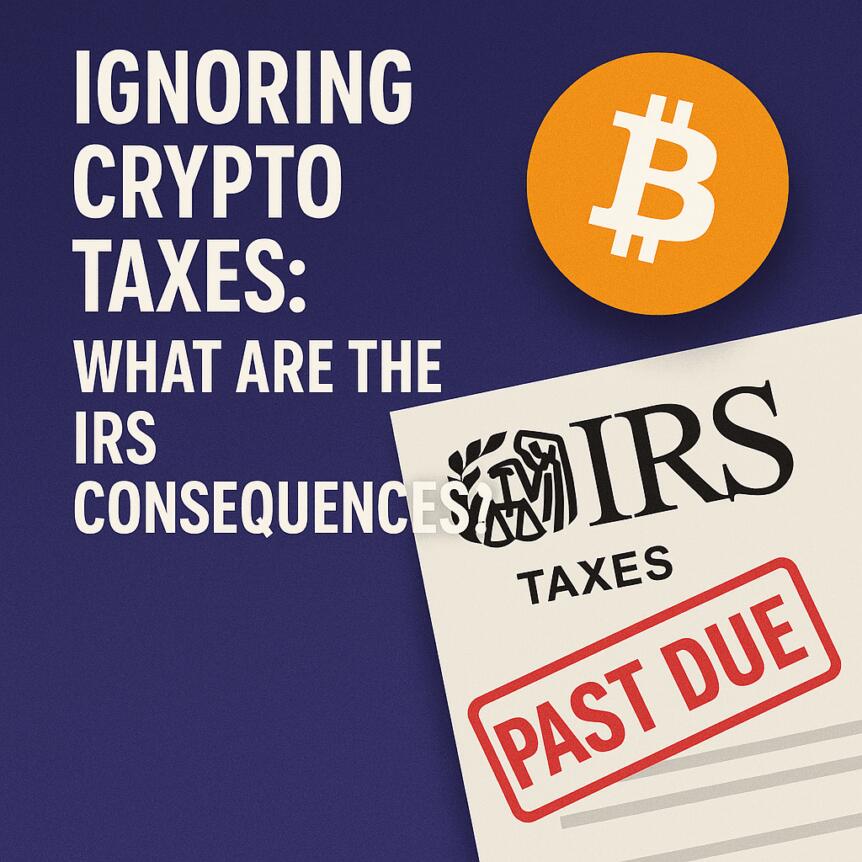Ignoring Crypto Taxes: What Are the IRS Consequences?

Cryptocurrency users worldwide face increasing scrutiny from tax authorities, which are implementing advanced methods to ensure compliance. Regulatory agencies, including the IRS, HMRC, and the ATO, treat cryptocurrencies as property, making almost every transaction potentially taxable. As global frameworks promote cooperation and transparency, crypto traders must stay vigilant to avoid penalties. Rapidly evolving regulations and technological advances in blockchain analysis require careful record-keeping and proactive compliance to navigate the complex landscape of crypto taxation.
-
Tax authorities worldwide classify cryptocurrencies as property, making sales, trades, and swaps taxable events.
-
Global regulatory cooperation via frameworks like FATF and OECD’s CARF enhances transaction tracking across borders and privacy coins.
-
Authorities leverage blockchain analytics firms like Chainalysis to trace wallet addresses and link them to real identities, even in decentralized and cross-chain transactions.
-
Maintaining detailed logs of trades, staking rewards, gas fees, and transaction timestamps is crucial for accurate tax reporting and avoiding penalties.
Many traders perceive crypto as outside traditional finance, but tax rules treat it as asset property, subject to reporting and taxation. Failing to comply can lead to fines, audits, and even criminal charges. This article details the consequences of unpaid crypto taxes, from initial notices to severe penalties, and offers guidance on getting back on track.
Why is crypto taxable?
Tax authorities like the IRS, HMRC, and ATO consider cryptocurrency as property or a capital asset, not currency, which makes its transactions taxable. This classification means that selling, trading, or spending crypto can create taxable events similar to those involving stocks or real estate. Activities such as staking, mining, airdrops, or yield farming are also reportable based on the fair market value at the time of receipt.
Even exchanging one cryptocurrency for another can trigger capital gains or losses, depending on its price at the time of disposal. Keeping meticulous records of all transactions—including timestamps, amounts, and market values—is essential for accurate reporting and compliance. Proper documentation simplifies tax filing and helps avoid penalties for underreporting or evasion, especially as rules become more complex.
Common reasons people omit crypto taxes
Many individuals neglect reporting their crypto transactions due to confusion, misinformation, or perceived complexity. Here are some frequent misconceptions and mistakes:
- Assumption of anonymity: Some believe cryptocurrencies are completely anonymous and untraceable, leading to non-reporting.
- Use of private platforms: Utilizing non-KYC exchanges or self-custody wallets may foster the false belief that transactions remain hidden from authorities.
- Misunderstanding taxable events: Many don’t realize that everyday activities like trading or selling crypto are taxable events, similar to conventional assets.
- Difficulty of compliance: Keeping detailed records and navigating changing tax laws deter some from full disclosure.
Did you know? Simply holding or hodling your cryptocurrency is not a taxable event. Taxes are generally triggered only when you sell, trade, or spend crypto profitably.
Tracking crypto transactions
Governments deploy sophisticated tracking tools and cross-border data-sharing systems to monitor crypto activity. Agencies collaborate with firms like Chainalysis and Elliptic, which analyze blockchain data to associate wallet addresses with real identities, even in DeFi or privacy-enhanced transactions.
Exchanges report user activity through forms like the US Form 1099-DA, and international agreements standardize data sharing via frameworks such as the OECD’s Crypto-Asset Reporting Framework (CARF). Blockchain-based platforms, mixers, and bridges leave traceable records, enabling authorities to follow transaction chains with high accuracy.
Consequences of non-compliance
Failing to report crypto earnings can lead to severe penalties. Initially, tax agencies may impose civil fines, interest, and late fees—up to 25% of unpaid taxes in some jurisdictions. Continued non-compliance increases the risk of investigations, frozen accounts, and data collection from regulated exchanges via legal channels.
In extreme cases, deliberate tax evasion can result in criminal charges, with potential prosecution, hefty fines, or imprisonment. Ignoring tax obligations not only damages your reputation but also raises future enforcement risks, emphasizing the importance of timely correction and voluntary disclosure.
Did you know? If your crypto investments are at a loss, you can employ tax-loss harvesting to offset gains, potentially reducing your overall tax liability legally.
Global efforts to tighten crypto tax enforcement
International cooperation and stricter regulations are expanding as regulators and organizations like G20, FATF, and OECD push to monitor and tax digital assets more effectively. The implementation of CARF ensures automatic sharing of crypto transaction data across borders, reducing offshore evasion opportunities.
Regulators are scrutinizing offshore crypto wallets, privacy coins like Monero (XMR), and unregistered exchanges, with actions including warning letters and enforcement against unlicensed platforms. These efforts reflect a global mandate to improve transparency and clamp down on unreported profits in the crypto space.
Did you know? Holding crypto longer than a year may reduce long-term capital gains tax rates in some countries, such as the US and Australia, offering an additional incentive to compliance.
Steps to rectify unreported taxes
If you’ve neglected to report cryptocurrency taxes, act swiftly. Gather transaction records from all platforms, including wallets and DeFi services. Use blockchain explorers and crypto tax tools like Koinly, CoinTracker, or TokenTax to identify gains and losses accurately.
You can submit amended returns or take advantage of voluntary disclosure programs, which many jurisdictions offer to mitigate penalties and avoid criminal charges. Prompt action demonstrates good faith, potentially reducing legal risks and facilitating a smoother resolution.
Maintaining compliance with crypto tax laws
The best approach to avoid penalties is to stay organized. Keep detailed logs of all trading activities, staking rewards, gas fees, and transaction timestamps. Utilize regulated exchanges to access reliable data, and stay updated with local tax regulations, which regularly evolve. For complex strategies like DeFi or cross-chain transactions, consider consulting a tax professional specializing in digital assets to ensure full compliance and accurate reporting.
This article was originally published as Ignoring Crypto Taxes: What Are the IRS Consequences? on Crypto Breaking News – your trusted source for crypto news, Bitcoin news, and blockchain updates.
You May Also Like

This U.S. politician’s suspicious stock trade just returned over 200% in weeks

New Crypto Investors Are Backing Layer Brett Over Dogecoin After Topping The Meme Coin Charts This Month
